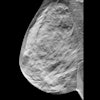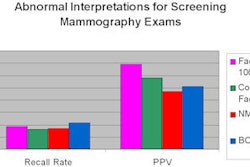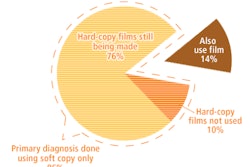Any medical center that performs mammograms knows that it will receive complaints from its patients. In the U.S., the Mammography Quality Standards Act (MQSA) requires that serious patient complaints must be resolved and statistics about these be maintained for at least three years by the center.
Facilities that perform mammograms are also required to advise patients who feel that their complaints are unresolved with information on how to file a complaint with the American College of Radiology (ACR) of Reston, VA, the accreditation organization, and also how to report unresolved complaints themselves to the ACR. As a result, the ACR receives hundreds of complaints from patients about excessive compression, excessive wait times, high fees, and the inability to obtain prior films.
The good news is that in a 10-year period between 1997 and 2007, only 132 complaints have been serious, according to Priscilla Butler, senior director of the ACR's breast imaging accreditation programs. Butler reported on complaints at the Society of Breast Imaging's recent postgraduate course held last month in Colorado Springs, CO.
As the accreditation body, the ACR is required to investigate and try to resolve complaints it identifies as serious adverse events. These are defined as events that may compromise clinical outcomes, such as the use of unqualified personnel, failure to send mammography reports or patient summary letters within 30 days, poor exam quality, and missed cancers. The ACR intervenes and conducts a thorough investigation when a facility fails to take appropriate corrective action in a timely manner.
The number of serious complaints have been as high as 20 (in 1998 and 2000) in a calendar year and as low as four (in 2005). Butler reported that 26.1% of complaints related to failure to send radiology reports and patient letters within 30 days, 22.3% involved patient injury as a result of the mammogram, 12.7% were missed cancers, 3.8% related to poor image quality of the exams, and 28% of the serious complaints were categorized as "other."
In view of the fact that 8,500 accredited mammography centers perform thousands of mammograms each year, Butler believes that this very low level of reported serious adverse events demonstrates that the centers are maintaining MQSA standards.
Related Reading
ACR introduces National Mammography Database, May 7, 2009
ACR, ARRS wrap up integration deal, May 5, 2009
ACR weighs in on industry relationships, April 30, 2009
Exceeding 'excellent': How breast centers track quality, February 17, 2009
Reports to FDA allege damage to breast implants during screening, June 15, 2004
Copyright © 2009 AuntMinnie.com



















